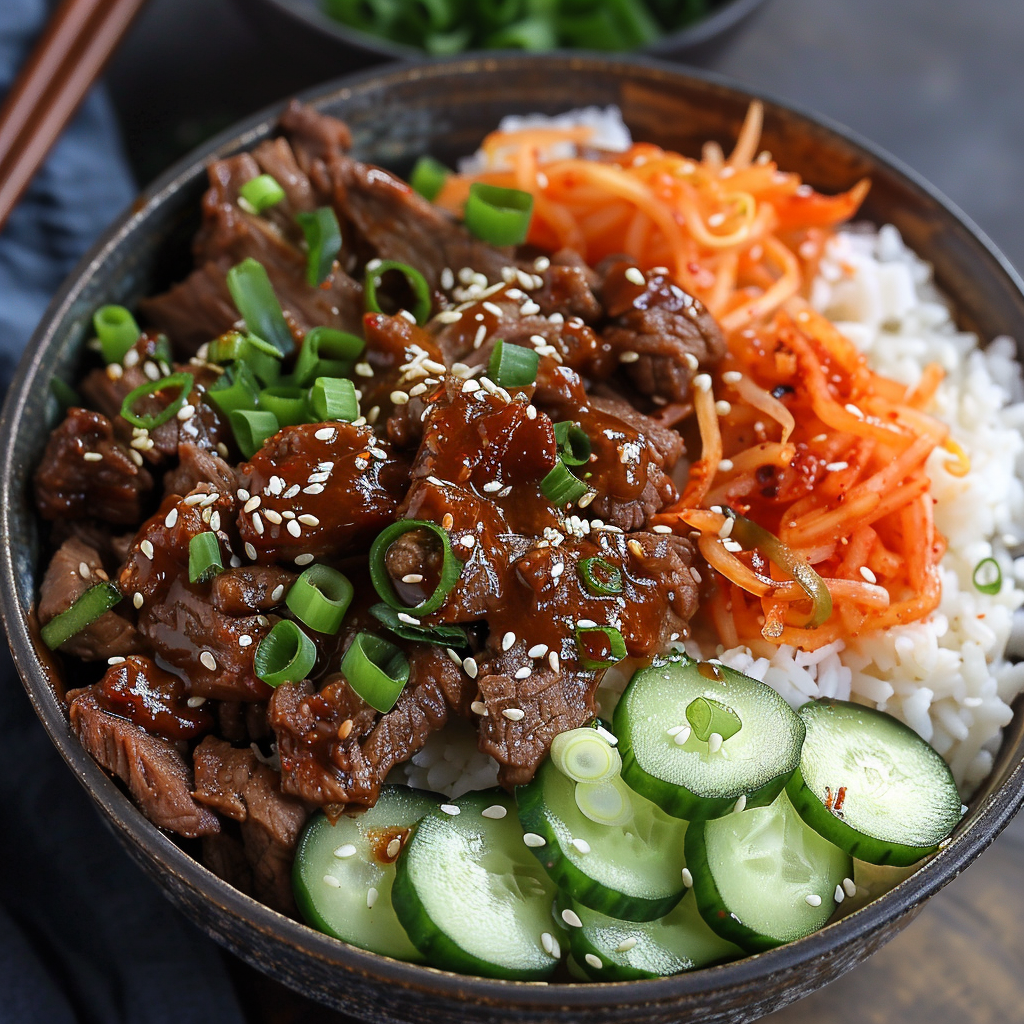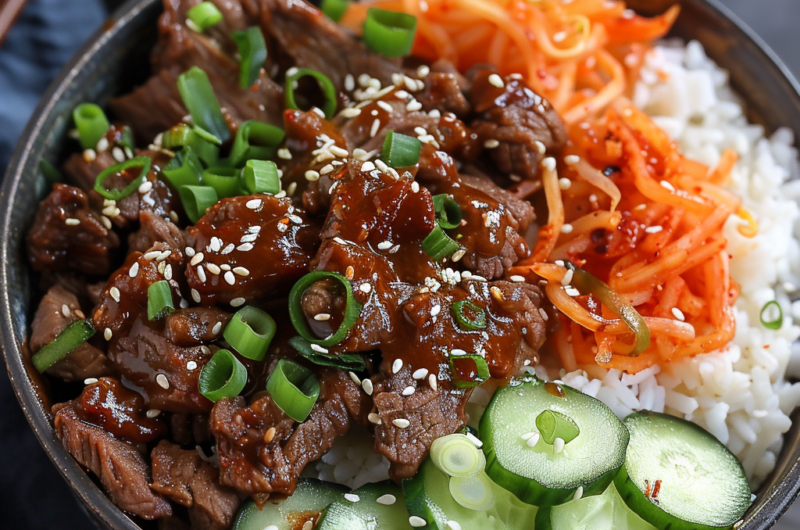The Korean Beef Bowl is a delightful fusion of flavors that has captured the hearts of food enthusiasts worldwide. This dish combines the savory and sweet notes typical of Korean cuisine, offering a quick, nutritious, and versatile meal option. Whether you’re looking for a speedy dinner solution or a meal prep staple, the Korean Beef Bowl delivers in both taste and convenience.
Ingredients Overview
Creating a perfect Korean Beef Bowl starts with selecting the right ingredients. Here are the essentials:
Essential Ingredients
- Ground beef: Opt for lean ground beef (93% lean) for a healthier option without sacrificing flavor.
- Soy sauce: Provides the salty umami base for the sauce. For a gluten-free version, use tamari or coconut aminos.
- Sesame oil: Adds a nutty aroma and depth of flavor.
- Garlic and ginger: Freshly minced garlic and ginger are crucial for that authentic Korean taste.
- Green onions: Both the white and green parts are used, adding freshness and a mild bite.
Optional Ingredients
- Gochujang: This Korean red chili paste brings a rich, spicy element to the dish.
- Honey: Balances the saltiness with a touch of sweetness. Other sweeteners like maple syrup or brown sugar can also be used.
- Rice vinegar: Adds acidity and brightness to the sauce. Substitute with apple cider vinegar or lime juice if needed.
- Red pepper flakes: For an extra kick of heat.
For more information on the health benefits of sesame oil, you can refer to this Healthline article.
Preparation Steps
Preparing the ingredients properly can significantly enhance the dish’s final flavor and texture.
-
Marinate the Beef (if using a marinade):
- Mix soy sauce, sesame oil, honey, rice vinegar, minced garlic, and ginger.
- Add ground beef and let it marinate for at least 15 minutes.
-
Prep the Vegetables:
- Thinly slice cucumbers, julienne carrots, and chop green onions.
- For a twist, consider pickling the carrots for extra tang.
-
Prepare the Sauce:
- Combine soy sauce, honey, rice vinegar, garlic, ginger, and gochujang in a small bowl.
- Adjust seasoning with red pepper flakes and sesame oil.
For tips on making perfect rice to accompany your beef bowl, check out this Bon Appétit guide.
Cooking Instructions
-
Brown the Beef:
- In a large skillet, brown the ground beef over medium-high heat, breaking it into small pieces.
- Add a tablespoon of soy sauce and some of the green onions midway through cooking.
-
Add Aromatics:
- Stir in minced garlic and ginger once the beef is mostly cooked. Sauté for about 30 seconds until fragrant.
-
Combine with Sauce:
- Pour the prepared sauce over the beef. Stir and cook for an additional 2-3 minutes until the sauce thickens and coats the beef.
-
Final Touches:
- Sprinkle the remaining green onions and sesame seeds on top.
Serving Suggestions
Traditional Serving
- Rice: Serve the beef mixture over a bed of steamed white rice.
- Garnishes: Top with toasted sesame seeds and extra green onions.
Alternative Servings
- Brown rice or quinoa: For a healthier grain option.
- Cauliflower rice: Ideal for a low-carb version.
- Lettuce wraps: Turn it into a fun, hand-held meal.
Garnishes
- Pickled vegetables: Adds a tangy crunch.
- Fresh veggies: Carrots, bell peppers, or cucumbers for added color and texture.
Variations of Korean Beef Bowl
Different Proteins
- Chicken or Pork: Ground chicken or pork can be used as substitutes.
- Tofu: For a vegetarian option, use firm tofu.
Vegetarian and Vegan Adaptations
- Plant-based ground meat: Works well for a vegan version.
- Extra vegetables: Add mushrooms, zucchini, or broccoli for more variety.
Expert Tips and Tricks
- Adjusting Spice Levels:
- Increase or decrease the amount of gochujang or red pepper flakes to suit your taste.
- Balancing Flavors:
- Ensure a balanced flavor by tasting the sauce and adjusting with more soy sauce or honey as needed.
- Making it Healthier:
- Use leaner meats and substitute white rice with cauliflower rice.
Storage and Reheating
- Storing Leftovers:
- Refrigerate the beef and rice separately in airtight containers for up to 4 days.
- Freezing:
- Freeze the beef mixture in a freezer-safe container for up to 3 months.
- Reheating:
- Reheat the beef gently in a skillet, adding a splash of water if needed. Microwave the rice with a damp paper towel over it to keep it moist.
Frequently Asked Questions
How can I make the dish less spicy?
Omit or reduce the amount of red pepper flakes and gochujang.
What are good substitutes for soy sauce?
Tamari or coconut aminos are excellent gluten-free alternatives.
Can I use a different type of meat?
Yes, ground chicken, pork, or even tofu can be used.
How do I ensure my beef isn’t greasy?
Use lean ground beef and drain any excess fat after browning.
What are some common mistakes to avoid?
Avoid overcooking the beef and ensure the sauce is not too thick or too thin by adjusting cooking time and ingredient ratios.
Conclusion
The Korean Beef Bowl is a versatile and flavorful dish that fits perfectly into any meal plan. With its quick preparation and endless customization options, it’s no wonder this dish has become a favorite among many. Try making it at home and enjoy the delicious fusion of Korean flavors in every bite!
For more delicious meal ideas, check out our Popcorn Shrimp Rice Bowls and our Sweet Chili & Ground Beef Salad with Rice Noodles.


